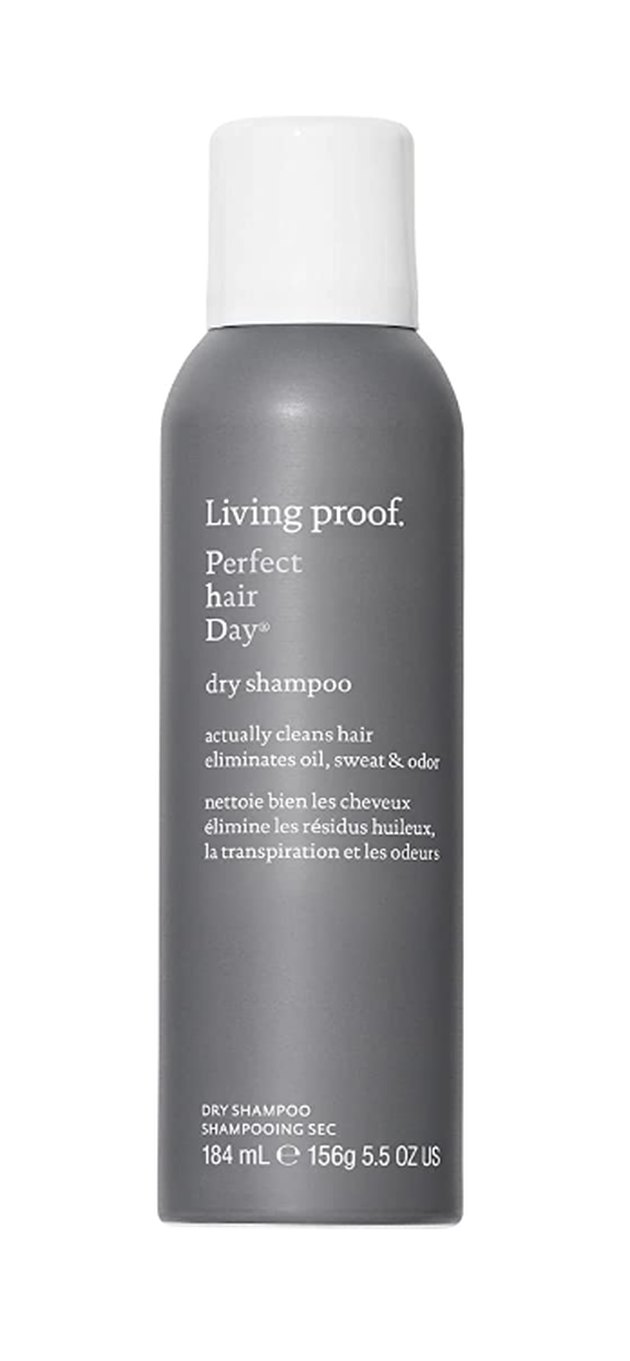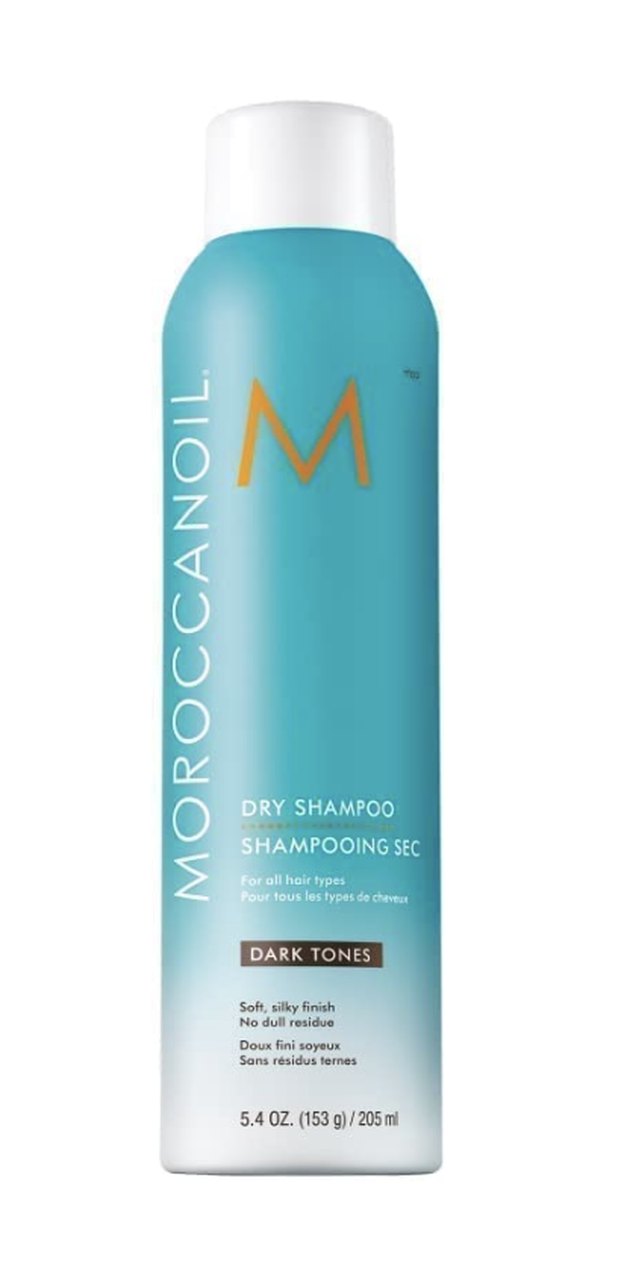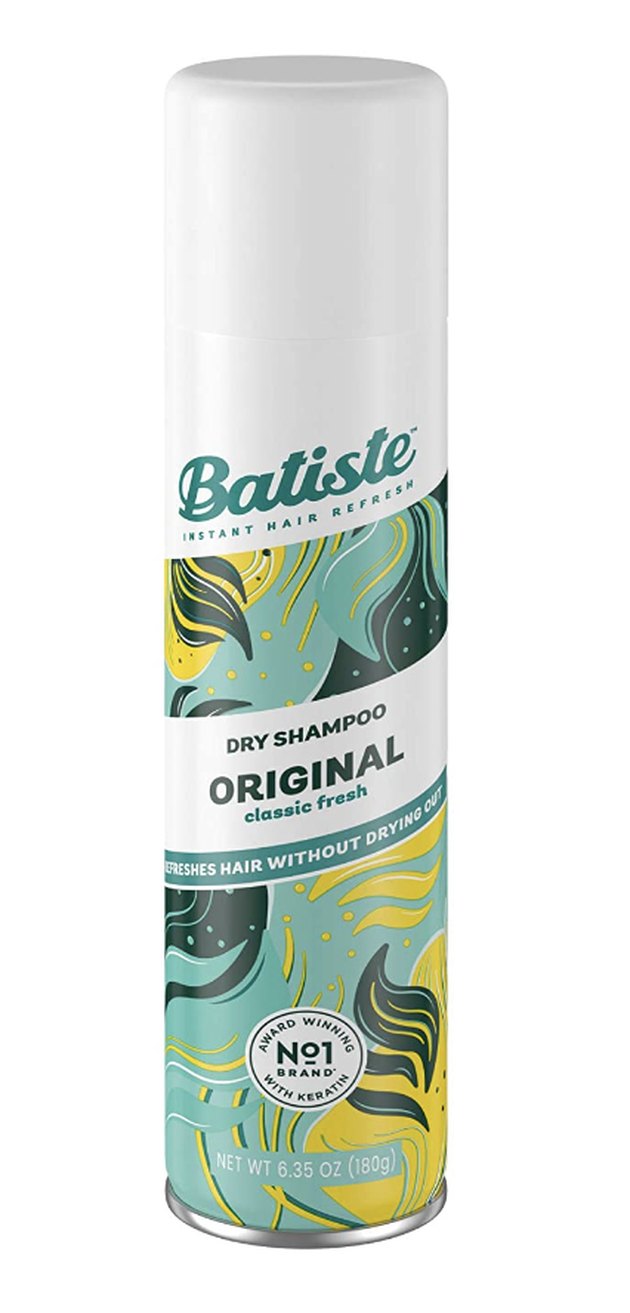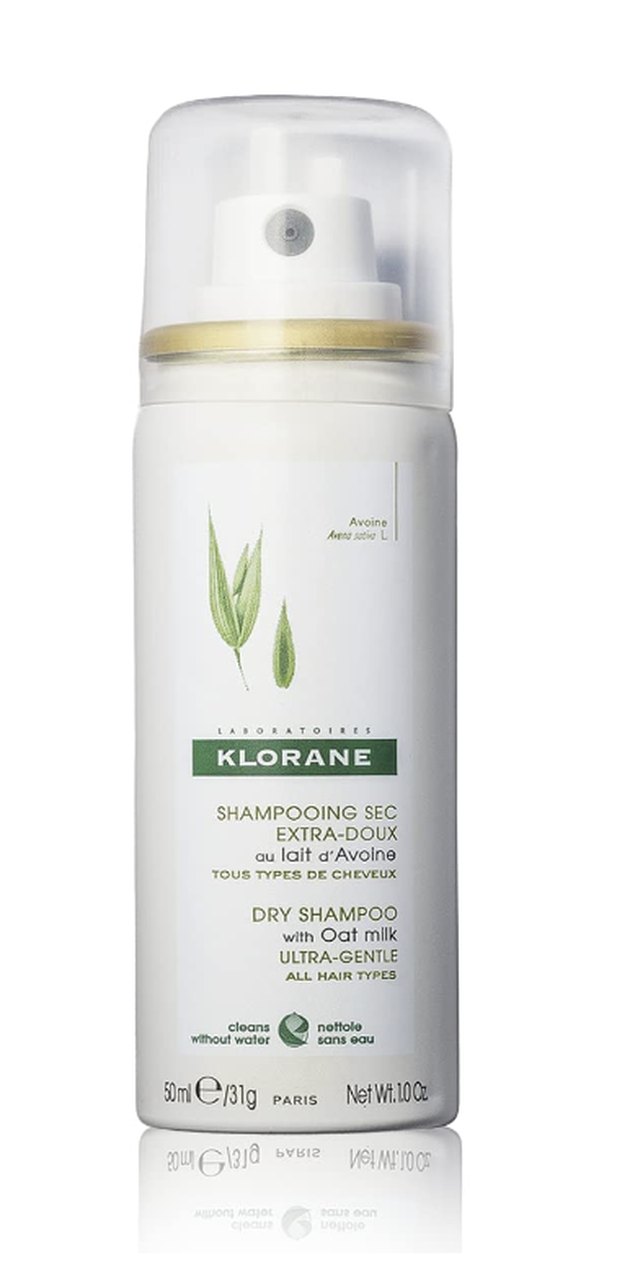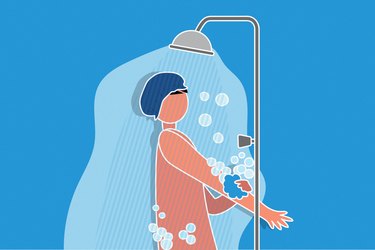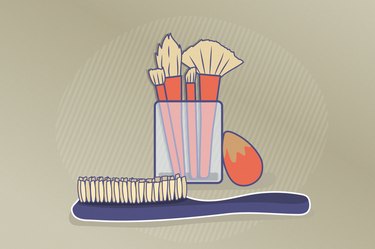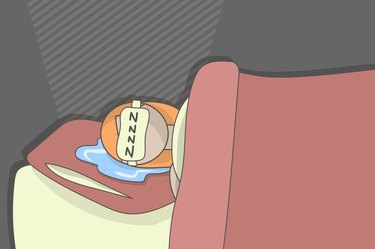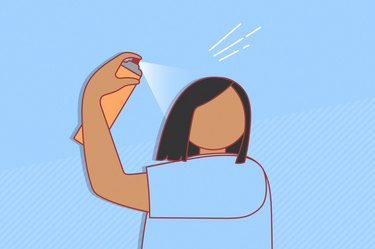
For many of us, dry shampoo is a staple in our daily hair care regimen. Seriously, who can deny its convenience? With just a few sprays, oily strands are magically made bouncy and fresh — all without stepping in the shower.
But if you're relying on dry shampoo as a substitute for washing your tresses, you might be doing your scalp and hair a disservice.
Video of the Day
Video of the Day
Here, dermatologists explain what could happen if you overdo it with dry shampoo, as well as how often to use it to maintain a healthy mane.
How Does Dry Shampoo Work?
"Dry shampoo works by absorbing excess oil and grease from the scalp and hair strands, giving the hair a cleaner appearance," says Aanand Geria, MD, a board-certified dermatologist based in New Jersey.
The secret to dry shampoo lies in its active ingredients — usually a starch powder or alcohol — that binds to the oils on the hair and scalp, says Y. Claire Chang, MD, a board-certified dermatologist at Union Square Laser Dermatology in New York City.
In addition to its grease-fighting power, many dry shampoo brands leave your locks smelling fresh, too. That's mainly because "dry shampoo may also contain fragrances to help mask odors," Dr. Chang says.
"However, it is important to note that dry shampoo does not actually clean the hair — it simply makes it look cleaner," Dr. Geria says.
Dr. Chang agrees: Dry shampoo does not rinse out dirt and oils from the scalp. It only temporarily disguises dirty hair.
How to Use Dry Shampoo
“The exact steps for using dry shampoo may vary slightly depending on the product and your specific hair type,” Dr. Geria says.
For the best results, always refer to the instructions on the back of the product.
While directions may differ by brand, Drs. Geria and Chang offer these general recommendations for applying most dry shampoos:
- Shake the can or bottle well to mix the contents thoroughly and ensure the product is evenly distributed.
- Part your hair into sections to apply the dry shampoo directly to the roots.
- For a spray, hold the bottle about six to 10 inches away from the scalp and spray the product in short bursts onto your roots.
- Focusing on areas that are particularly greasy, work in sections around your scalp, lifting up your hair and spraying underneath.
- If using a powder, sprinkle lightly over the roots. Start with a small amount and add more as necessary.
- Whether using a spray or powder, let the dry shampoo sit for at least 30 seconds to absorb excess oils and grease, then gently massage the product into your roots.
- Use your (clean) fingertips to evenly distribute the dry shampoo throughout your hair.
- Gently brush or comb to dispense any remaining residue, and style your hair as desired.
Possible Risks of Using Dry Shampoo Daily
"While dry shampoo can be a convenient way to freshen up your hair in between washes, there are some potential issues associated with its use," Dr. Geria says.
1. You Could Develop Contact Dermatitis
If your scalp feels scratchy, your dry shampoo might be at fault.
"Dry shampoo may sometimes cause an irritant or allergic contact reaction due to a sensitivity to one of its ingredients," Dr. Chang says.
Known as contact dermatitis, this condition can present with redness, flaking, itching or burning of the scalp, she says.
Common allergens or irritants found in dry shampoo products include:
- Fragrances
- Preservatives
- Other chemicals
"If you have a known sensitivity to a specific ingredient, it's important to read the product's ingredients label carefully," Dr. Chang says.
Avoiding the irritant is the best way to prevent a case of contact dermatitis, which usually clears up on its own once you've stopped using the problematic product.
If you're not sure which ingredient is causing your symptoms, see an allergist or dermatologist for allergy testing.
2. Your Hair Follicles Might Get Clogged
Overuse of dry shampoo — without washing your hair — can create a buildup of the product (and dirt) on your scalp, Dr. Geria says. As more gunk accumulates, it may potentially lead to clogged hair follicles.
And when your hair follicles and pores become blocked, you may develop scalp acne and follicular inflammation, also known as folliculitis, Dr. Chang says. Folliculitis often takes the form of inflamed bumps or pimples.
In addition to blemishes, other signs of folliculitis include the following, per the Mayo Clinic:
- Pus-filled blisters that break open and crust over
- Itchy, burning skin
- Painful, tender skin
Though a mild case of folliculitis will typically heal on its own, a more serious bout might require an antibiotic or antifungal, according to the Mayo Clinic.
3. You Run a Greater Risk of Hair Breakage
"Excessive use of dry shampoos that contain alcohol can make your hair dry and fragile," Dr. Chang says. Problem is, dry strands are more likely to break.
To make matters worse, dry shampoo isn't typically formulated with moisturizing or nourishing ingredients like standard shampoos and conditioners.
And it's not just the ingredients in dry shampoo that can harm your hair.
"Improper application and removal of dry shampoos can also increase the risk of hair breakage," Dr. Chang adds. For example, "aggressively rubbing or brushing the hair while using dry shampoo can cause mechanical damage and hair breakage."
4. You Might Experience Hair Loss
"There is some debate among experts about whether or not dry shampoo can cause hair loss," Dr. Geria says. "While some doctors believe that overuse of dry shampoo can potentially clog hair follicles, trap bacteria and lead to hair loss and breakage, others contend that when used properly, dry shampoo is not likely to cause hair loss."
Dr. Chang agrees that "there is no concrete scientific evidence that dry shampoo directly leads to hair loss."
However, excessive and improper dry shampoo use can contribute to poor scalp health, scalp inflammation and shedding. All together, these things may add up to hair loss, she says.
5. It Can Expose You to Possible Cancer-Causing Chemicals
"Some dry shampoo products have been found to contain high levels of benzene, a chemical that has been linked to cancer in humans," Dr. Geria says.
Benzene is a colorless, flammable liquid produced through natural processes (like volcanoes and forest fires) as well as manmade methods, where it's mainly used in the rubber industry, oil refineries, chemical plants, shoe manufacturers and gasoline-related industries, according to the American Cancer Society.
But benzene can also be found in consumer products such as dry shampoo. In fact, various aerosol dry shampoo brands have been recalled due to the alarming presence of the chemical, per the FDA.
Primary exposure to benzene occurs through breathing in contaminated air (like an aerosol spray). And studies show that people who've been continuously exposed to the chemical have a greater risk of leukemia and other blood-related cancers, per the American Cancer Society.
To protect yourself, do your research before buying a dry shampoo product. "It is important to choose a reputable brand of dry shampoo and to follow the recommended usage guidelines to minimize your risk of exposure to harmful chemicals," Dr. Geria says.
How Often Should You Use Dry Shampoo?
While frequent use of dry shampoo may come with potential downsides, it can still be a healthy part of your daily hair care routine when applied correctly and used in moderation.
You may be thinking: "What does in moderation mean?"
"Dermatologists generally recommend using dry shampoo no more than two days in a row before washing your hair with water and traditional shampoo to remove any buildup of the product and dirt on your scalp and hair," Dr. Geria says.
Dr. Chang agrees: Most folks shouldn't freshen their mane with dry shampoo more than two to three times per week.
That said, "some individuals may be able to use dry shampoo more [or less] frequently than others, depending on their hair type and individual needs," Dr. Geria adds.
For example, "those with dry hair or scalp conditions may want to use dry shampoo less frequently than those with oily hair," Dr. Chang says.
Dermatologists’ Tips for Using Dry Shampoo
- Choose a dry shampoo formulated for your hair type and concerns
- Read the product ingredient list carefully to identify potential allergens or irritants
- Follow the product’s instructions to avoid improper application
- Use in moderation (in general, no more than two days in a row)
- Wash your hair with traditional shampoo between uses
The Best Dry Shampoos for Daily Use
"The best dry shampoo varies person by person," Dr. Chang says. "Factors including hair type, scalp condition, ingredient sensitivities and scent preferences will determine the best dry shampoo for you."
Try one of the following dermatologist-approved dry shampoos:
1. Living Proof Perfect Hair Day Dry Shampoo
This fan-favorite is formulated with a starch and mineral blend that absorbs excess oil and sweat. It's lightweight, gives the hair a more voluminous appearance and touts a powder-removal aspect to reduce visible residue, Dr. Chang says.
2. Moroccanoil Dry Shampoo
"Moroccanoil Dry Shampoo is formulated with rice starch (to absorb excess grease) and contains argan oil, which is rich in vitamin E and essential fatty acids to help nourish the hair," Dr. Chang says. She also likes that it's available in light and dark tones to accommodate different hair colors.
3. Batiste Dry Shampoo
The Batiste brand "has a wide range of [dry shampoo] products for different hair types and concerns, including those that volumize, texturize or add color," Dr. Chang says.
4. Klorane Dry Shampoo With Oat Milk
Both Drs. Chang and Geria recommend this gentle plant-based dry shampoo formulated with soothing oat milk (and without parabens and sulfate).
"This product is a favorite among many hairstylists and reviewers for its ability to absorb oil and grease without leaving behind any residue or buildup," Dr. Geria says. "It is also gentle on the scalp and has a pleasant scent."
So, How Bad Is It Really to Use Dry Shampoo Every Day?
With its instant results, dry shampoo is a quick, convenient hair fix that's especially handy on hectic days. But, like most things in life, it's possible to get too much of a good thing.
"While dry shampoo can be a useful tool for extending the time between hair washes, it's important to use it in moderation and be aware of the potential risks associated with its use," Dr. Geria says.
From scalp irritation to hair breakage, overdoing it with dry shampoo can sabotage your scalp and hair health.
The takeaway? Dry shampoo should not replace regular shampoo. "It can be used as needed in between washes or as an emergency (i.e., you woke up late for work or school)," Dr. Chang says.
In other words, a little goes a long way for your locks.
Tip
“Everyone's hair and scalp are different, and some individuals may be more susceptible to the negative effects of dry shampoo than others,” Dr. Geria says. “If you're concerned about the potential impact of dry shampoo on your hair health, it may be helpful to discuss your concerns with a dermatologist or other hair care specialist.”
Was this article helpful?
150 Characters Max
0/150
Thank you for sharing!
Thank you for your feedback!
Is this an emergency? If you are experiencing serious medical symptoms, please see the National Library of Medicine’s list of signs you need emergency medical attention or call 911.

